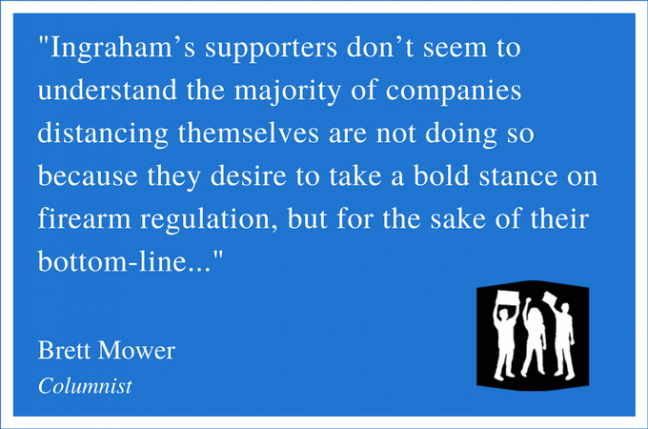In the wake of March for Our Lives — a global demonstration aimed at gun law reforms — many right-wing organizations have launched fear-based campaigns regarding an “assault” on the Second Amendment. While this alone is to be expected, many March for Our Lives movement supporters felt it a step too far when Fox News’ Laura Ingraham, host of the Ingraham Angle, took to Twitter to harass Parkland shooting survivor David Hogg about not being accepted into some colleges.
Hogg’s retaliatory tweet, which consisted of a listing of Ingraham’s top 12 advertisers, called for a boycott of any company that continued to advertise during Ingraham’s airtime. Regardless of how one might feel about the actions of either side in this Twitter spat, it’s pretty difficult to deny how effective Hogg’s tweet was in encouraging advertisers from dropping the Ingraham Angle.
As the list of advertisers that dropped Ingraham continued to grow, many of her supporters such as Fox News contributor Geraldo Rivera began to see this as an attack on her free speech.
That’s simply not true. Ingraham being forced off the air is not a violation of free speech or an infringement of the First Amendment, but rather a result of the free capitalist market at work.
Ingraham’s supporters don’t seem to understand the majority of companies distancing themselves are not doing so because they desire to take a bold stance on firearm regulation, but for the sake of their bottom-line and the future of their company’s sales. Until Ingraham’s tweet, the idea of a company advertising on The Ingraham Angle could be viewed as a powerful tool in marketing to right-leaning consumers, without much danger of alienating left-wing consumers.
What Ingraham’s tweet did was force each company that runs advertisements on her show to decide if they want to be associated with someone who makes fun of school shooting survivors on Twitter, as opposed to someone who does pretty much anything else.
Besides the understandable motivation of not wanting to be associated with someone who takes cheap-shots at the personal lives of a school shooting survivor, an even stronger motivating factor for companies is a need to look out for their profits.
When more than 1.2 million demonstrators protest outside of numerous capitol buildings across the country it sends a clear message to companies — a group of highly energized consumers feels strongly about an issue and they’re willing to give up their weekend to protest it. So it’s not a far reach for companies to understand these demonstrators are also likely to boycott products and protest with their wallets, specifically any product that may be associated with an opposition to the cause they believe in.
Furthermore, it’s important to point out that companies such as the ones that dropped themselves from Ingraham’s show certainly understood what effect it would have on their younger potential customers. One of the most important age demographics any company can latch onto right now is millennial consumers, not just because of their dominant presence on social media, but the potential for making an impressionable young consumer a customer for life.
Showing solidarity with a group that has suffered from horrific violence is a genuinely strong marketing strategy for establishing lifelong customers, even if that means sacrificing potential customers of a much older demographic.
The decision so many companies made to pull advertising from Laura Ingraham’s show should not be viewed as an attempt to silence a controversial view. If that were the case, Ingraham’s past actions would undoubtedly have ended her career before it ever started. Instead, the outcome of Hogg and Ingraham’s Twitter exchange should truly be viewed as nothing more than a free market responding in the most efficient way possible — by siding with consumers more likely to turn long-term profits.
It will be important to keep this in mind when undoubtedly controversial events take place in the coming years. This isn’t the first time anyone has argued free speech is “under attack,” and it certainly won’t be the last.
Brett Mower (bmower@wisc.edu) is a senior majoring in journalism and economics.


